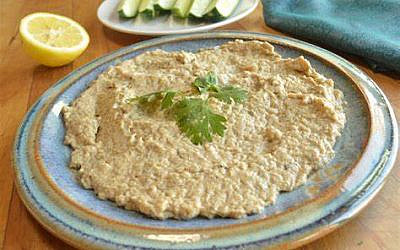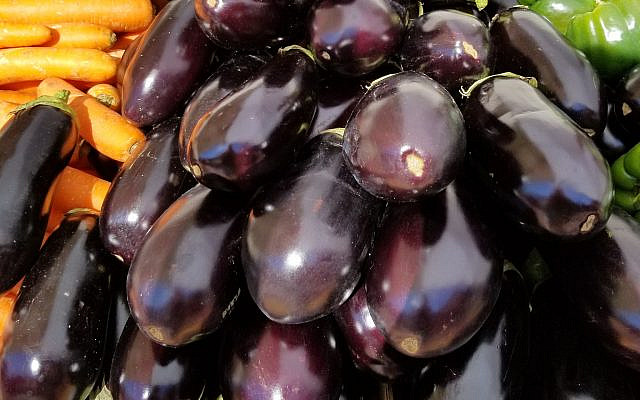Mediterranean Memories Begin with Roasted Eggplant and Baba Ganoush

As a kid, I had no interest in eggplant. I mean, it’s purple, and what does it have to do with eggs, anyway? One day—I might have been a young teen—my mother made ratatouille. I suspect she was inspired by Julia Child’s public television program, although my mother’s version of the recipe would have been a simplified one. In any case, mom’s ratatouille was an immediate hit and became a family favorite.
My family lived in Pittsburgh’s urban-residential Squirrel Hill neighborhood, but we routinely stopped at roadside produce stands and shopped at the East Liberty farmers’ market. In late summer through fall, round, shiny and very purple eggplants were abundant.
When my high school friends and I started “dining out” together, we favored Middle Eastern restaurants (two of our favorite restaurants are still there!). The food was tasty and inexpensive so that a couple of menu items—typically, baba ganoush and hummus—plus a few pitas could feed four or five of us.
Baba ganoush became a lifelong favorite, which is conveniently easy to make (see recipe below).
During my high school years, my mother and other local Hadassah women decided to raise money to support our Young Judaea program by selling snacks at Pittsburgh’s large annual outdoor art market, the Three Rivers Arts Festival. Curiously, the Hadassah women decided against Israeli-style food and, instead, baked hundreds of pans of the Eastern European Jewish standby luckshen kugel (noodle pudding), which they sold by the slice. (Some of the funds they raised went toward funding my year in Israel on Young Judaea’s Year Course.)
During that post-high school gap year, I planted and then later picked eggplant (hatzilim חצילים) along with tomatoes, cucumbers and peppers on Kibbutz Ein Gedi in the Judean desert. Even now, when I reminisce with a friend from that trip, eggplant always enters the conversation. Recently, I drew on my recollections of Israeli cuisine to create another eggplant recipe by adding roasted, locally grown cherry tomatoes. I call this dish “Roasted Eggplant+” (see recipe below).
I associate hatzilim with some of my best memories — memories that feature family, friends and a good harvest –and I show my appreciation when I eat them by reciting the traditional blessing over vegetables: Barukh ata Adonai Eloheinu melekh ha’olam borei p’ri ha’adamah (“Blessed are You, Adonai our God, Ruler of the universe, who creates the fruit of the ground”).
And then, non-traditionally, I suggest adding the blessing for miscellaneous” food because it can encompass the bounty of good friends, good memories and the land: Barukh ata Adonai Eloheinu melekh ha’olam shehakol niyah bidvaro (“Blessed are You, Adonai our God, Ruler of the universe, at whose word all came to be”).
Two recipes start as one: Baba Ganoush and Roasted Eggplant+
For each dish:
1 – 1½ pounds eggplant
1 head garlic wrapped in foil
Olive oil
Salt
Remove eggplant’s stem and slice in half lengthwise. Place face down on a foil-lined baking sheet. In one corner of the baking sheet, place the garlic. Roast in oven at 425o F (or 400o F in toaster oven) until the eggplant is soft throughout (about 30-40 minutes).
Let cool. Then scoop eggplant flesh into a bowl or food processor, adding 2-3 cloves of garlic squeezed from the papery skin. Chop with a knife, mash with a fork or pulse a few times to combine but not pulverize.
Baba Ganoush
Eggplant prepared as above
2 Tbsp. tahini (mixed well)
1 Tbsp. + a drizzle of olive oil
1 tsp. lemon juice
1 tsp. salt
Zaatar
Add tahini, Tbsp. of olive oil, lemon juice and salt to the eggplant mixture and stir well. If it seems thick, add water, 1 tsp. at a time until the mixture reaches desired consistency. Adjust salt to taste. Decant to a serving bowl. Drizzle a bit of olive oil and sprinkle with zaatar. Serve with pita wedges, pita chips, crackers or sliced vegetables.
Roasted Eggplant+
Eggplant prepared as above
1 pint cherry or grape tomatoes
2 Tbsp. divided + a drizzle of olive oil
Salt
Fresh pita, pita chips, baguette or crostini
Rinse cherry tomatoes, place in foil-lined baking dish, drizzle 1 Tbsp. olive oil on top, sprinkle with salt and roast in that same oven for 10 minutes, until tomatoes are soft, brown and mostly popped. Tip: Working in batches, eggplant and tomatoes can be roasted equally well in a toaster oven.
Chop, mash or process the roasted tomatoes with the eggplant. Add Tbsp. of olive oil and mix. If it seems thick, add water, 1 tsp. at a time until desired consistency. Adjust salt to taste. Decant to a serving bowl. Drizzle a bit of olive oil. Serve with pita wedges, pita chips, crackers or sliced vegetables.




